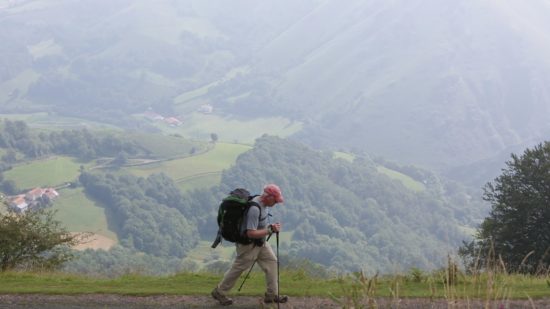
Still from Phil’s Camino
West Los Angeles- CA (LA ELEMENTS) 8/2/2016 – “So initially when you get cancer, you’re striving to be cured and that’s what doctor’s do, they cure you,” says Phil Volker in Phil’s Camino, the documentary short about his physical and spiritual journey taken while battling stage 4 cancer. “But I’ve discovered that there’s a difference between being cured and being healed. Being cured is being over your disease. To me right now at this point, I’m striving to be healed which means that you’re reconciled with the bigger picture. You’re reconciled with God and your family and all the important things. So whether you’re cured or not is sort of secondary.”
Phil’s Camino has been making an impression throughout the 2016 film festival circuit. Premiering at SXSW in March where it was nominated for the Grand Jury Award, this film has moved on to win other high profile nominations and awards including the Audience Award for Best Documentary Short at the Palm Springs International Short Festival. Currently, Phil’s Camino is having an Oscar qualifying run at the Laemmle Royal Theater July 29th through August 4th, screening daily at 12 noon.
It is a scene of serenity that opens this film. Set in Vashon Island off the Washington state coast, Volker takes a picturesque drive on a road surrounded by an expansive forest so emblematic of the Pacific Northwest. Boarding a ferry and sailing across the water en route to Seattle, the sounds of the seagulls mingle with the soothing strains of “Come and Walk” by composers Dan Bern and Eric Kufs. All of this is abruptly broken by the heavy clicking of the chemotherapy pump as we witness Volker being treated for his stage 4 cancer at Swedish Cancer Institute.
Confronting cancer, especially in an advanced state, would be overwhelming for anyone and this film doesn’t shy away from that fact. There is the grief from Volker’s wife Rebecca as she faces the possibility of a life without her husband and there are the occasional flashes of frustration and perhaps fear from Volker himself. But there is also a sense of joy as the subject of this documentary has chosen to take on the quixotic task of building his own Camino de Santiago, that is the pilgrimage route in Spain leading to the Cathedral of Santiago de Compostela where it is believed that the bones of the apostle St. James the Greater are sheltered.
Several years ago, Volker wanted to travel to Spain to take the pilgrimage, which in its entirety spans 500 miles. Undergoing chemotherapy at the time, this feat was impossible, so, he built his own Camino on his ten acres of property. Calculating the number of laps needed to equal 500 miles, Volker started walking on December 21st of 2013 and completed his goal on May 12th 2014.
Surprisingly, for a documentary that addresses mortality as much as it does, there is also a sense of wonder in this film. A sense of wonder created by the opportunity that presents itself for Volker to take off to Spain and walk the route that so many pilgrims have travaeled centuries before him.
Phil’s Camino Trailer from Jessica Lewis on Vimeo.
Both Phil Volker and producer Annie O’Neil were on hand for a panel discussion following the screening on July 30th, the date I attended. After the panel discussion, I had the chance to catch up with Volker and O’Neil after the screening and discover more about their experiences both during and after the making of this documentary.
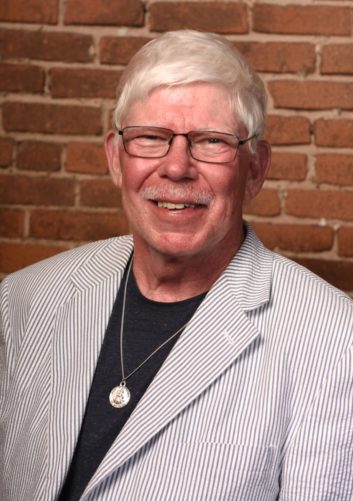
Phil Volker
Phil Volker
This documentary has already been wining prizes on the festival circuit. What is it about Phil’s Camino that speaks to so many different people?
“What’s happening with the story in various festivals as it travels around, what I’m seeing is the experts and judges and all those people, they sort of like the arty films and maybe the edgy films, and our film is really appealing to the audiences. A lot of our awards are audience awards. That’s very heart warming that the people who relate to it and can understand it and are moved by it, are the people and not so much the judges and the experts. In my mind we’re kind of like Dorothy in The Wizard of Oz We’re pulling back the curtain and saying, ‘Cancer you’re not such a big deal’ It’s such a fearful thing and we’re saying, ‘fear not.’
When you were in Spain, you actually completed an extensive part of the Camino. You had the beginning point, the ending point and a lot in between. I understand that you covered 375 miles?
“Out of the 500. I had 27 days to walk so I…athletic people could possibly walk it in 27 days but I wanted to walk it at my own pace so I could see things. There were things to see and participate in.”
What was your feeling, if you could put it into words when you reached your destination? When you reached the church?
“Well it was very moving getting to Santiago, very moving, but it was a little anticlimactic too because I had such a great time and such a meaningful time along the way. Getting there. That that’s really what I remember more.”
The journey?
“The journey, the people you meet, the places, the beauty. It was so beautiful that I had no place to put the beauty. I would cry all the time.”
What was your inspiration for walking the camino in the first place?
“Really, the vehicle for all this with a lot of people in America is watching, The Way with Martin Sheen which when I first saw it really grabbed me and then I saw the documentary, Walking The Camino: Six Ways of Santiago with Annie and that was a whole other connection.”
One final question, I heard that while you were in Spain you ran with the bulls?
(laughs) “I think they might have turned out to be cows….but I don’t know. I’m not sure. But it was exciting! You know I did some research on it after I got back to the states, what it stood for and how it played out in history and it’s very sort of a meaningful thing for Spanish people and I was just doing it because it was there in front of me and I said, ‘Well, here I am. This must be part of my Camino.’
So it wasn’t planned ahead of time at all?
“No, as a matter of fact it wasn’t even in Pamplona, it was in the next town in Estrella. All the towns have them. Pamplona is the most famous but other places have it too.”
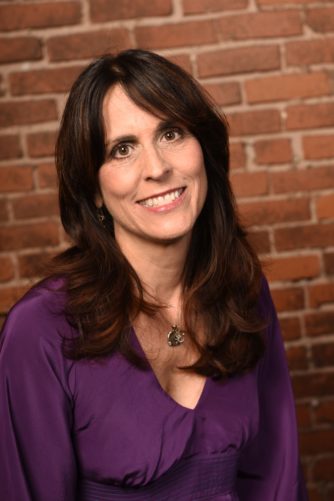
Phil’s Camino Producer Annie O’Neil
Annie O’Neil
How did you get your start as a filmmaker?
“Well, I consider myself the luckiest person in the world. I had a friend who asked me about the Camino de Santiago. She said, ‘Have you ever heard of the Camino de Santiago?’ and I said, ‘Yes. I’ve always wanted to do it,’ She ended up making the documentary, Walking The Camino: Six Ways To Santiago and I was a co-producer on that film. I feel as a co-producer I was like riding in the passenger’s seat and watching how she was putting everything together and then observing how the film festival run unfolded after that. Plus, it’s such a beautiful film and I was so fortunate to be featured in it and Phil saw it and reached out to me and I just thought, ‘This is a great film! Who can I get to make it?’ You don’t really bring stories to people, you find the stories. So, I realized this is my film. This is the film I’m meant to make. So I had made a series for kids back in the ‘90’s. It was called, A Day With Annie, A Day With Annie on the Farm, and things like that. So I kind of knew my way around a little bit but I didn’t expect that this would happen so it was a wonderful surprise. I’m still moved by Phil’s story today, as I was when I first met him.”
Phil’s Camino has been really well received. You premiered at SXSW and you picked up a nomination?
“ We were nominated for their Jury Prize. We didn’t win but we were nominated.”
I’m guessing that was definitely one of those times when it was truly an honor just to be nominated?
“It was a huge honor to be nominated. It was a huge honor to be accepted. It felt like a huge honor to even submit you know, to think that big and then to be accepted and then to find out that we were nominated for the Jury Prize and then since then, we’ve won so many awards. It’s really been just mind blowing.”
What is it about this movie that you feel is resonating with the film festival circuit?
“I think what’s resonating is the more existential question, ‘Why are we here?’ How can we make our life a life of purpose? What do we do when we get knocked down’ and unfortunately I think today every single person has some connection with someone with cancer. If it’s not themselves, it’s their sister or their neighbor or their friend or their colleague, it’s so much in people’s minds.”
“ I once heard that comedy is when you recognize; you laugh because you recognize. But I think that emotion is when you recognize and I think people recognize Phil, and they recognize themselves in this and I think that really, it’s so simple. It’s a different way of looking at life that I think many of us are seeking this kind of wondering and this kind of ‘What’s the purpose?’ ‘What do we do when we can’t do what we want to do?’ That for me is the biggest lesson of the film. Getting to Spain was great and certainly visually and filmically. Thank God he got to Spain because how beautiful is that? But the real message of the film is, ‘you can have what you want as long as you’re ok with it looking different than you thought it might look.”
“He had the Camino without going to Spain because that’s what he wanted. And in some ways, he has more. He is still walking the Camino. He still walks everyday he has people come and walk with him. He has neighbors; he has someone who’s blind who walks with him. So he is now part of the community and also he has become this person in his community that when someone gets a diagnosis, one of their friends will say, ‘You’ve got to go walk with that guy Phil.’ And so he’ll walk with them and talk with them and I mean that’s such a gift.”
Phil looks great. I teased him about the fact that when he was in Spain he ran with the bulls.
“Yes! Yes! And the crew was like, ‘We can’t let him do this! We have a responsibility to his wife not to let him run with the bulls!’ And he would not be moved. So they had to go, ‘Ok, if he’s going to do this…’ they practiced running with him, they had a strategy with him because they were like, ‘If he’s going to do it we have to make sure he does it right and goes home. We’re not going to explain to Rebecca…’
This film has its moments of “facing the reality” of course it does but at the same time, there’s a lot of levity as well.
“I know, surprisingly. We always laugh because when we went to South by Southwest our wonderful publicist Nadine Jolson was there and she was doing all the prep. She was getting ready for our premiere and she arranged with the theater that in the lobby there was an extra chair because she knew that a man with stage 4 cancer was coming. He got out of the car and he had his shades on, he had a seersucker jacket on over his jeans. She was like, ‘Mr. Hollywood, where’s the guy with cancer? I was expecting some guy to hobble in who needed a chair.’ He’s looking so good and you know it’s partly his attitude and partly his doctors working so hard to make him as healthy as possible and it’s just him being him.”
As a documentary filmmaker yourself, what are some other documentaries that you’ve seen on the festival circuit that have impressed you?
“Well I have to say that when we were touring Walking The Camino: Six Ways To Santiago I saw a short documentary called, A Second Chance, by David Aristizabal. In some ways I wonder if I’m influenced by that film because I still think about it today. Incredible film.”
Phil’s Camino will be showing at the Laemmle Royal Theater on Thursday, August 4 at 12 noon. Call (310)478-3836 for further details.
All images for this article courtesy of Jolson Creative unless otherwise noted.

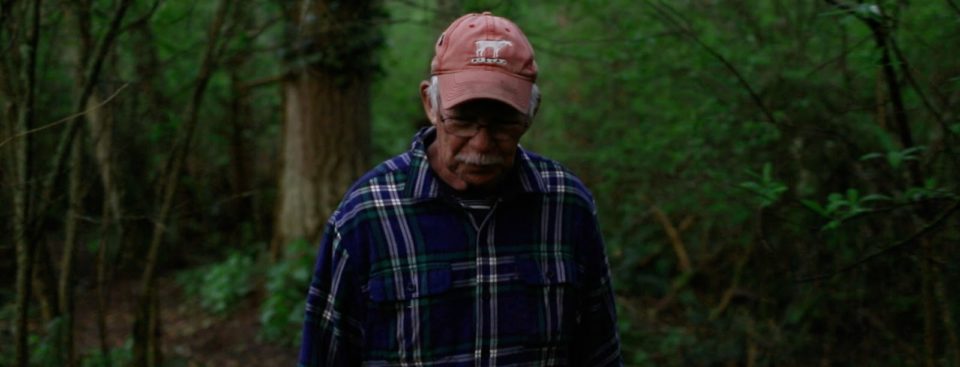

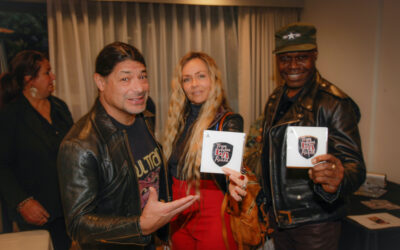

No Comments